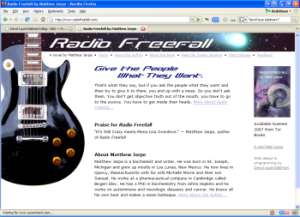Inspired by an e-mail from my friend Matt Jarpe yesterday afternoon, I decided to extend this promotional kick I’ve been on further and discuss author blog promotional tactics. I know there are approximately 2.6 zillion gajillion posts out there on effective blogging, so feel free to transfer that grain of salt you were serving with my recent blog posts about book promotion to this one. This is just what’s worked for me; your mileage may vary.
 (Matt Jarpe, by the way, is the author of the upcoming Radio Freefall, due out this summer from Tor. Matt’s also a very smart guy with a very wry sense of humor, so his blog should make for interesting reading. I’ve gotten a chance to read about half of Radio Freefall, and it’s quite a delectable concoction. I told Matt it reads like something Philip K. Dick might have written if he’d roadied for Metallica, and it’s absolutely true, and I’m going to repeat it as often as possible in hopes that Tor will stick it prominently on the book jacket.)
(Matt Jarpe, by the way, is the author of the upcoming Radio Freefall, due out this summer from Tor. Matt’s also a very smart guy with a very wry sense of humor, so his blog should make for interesting reading. I’ve gotten a chance to read about half of Radio Freefall, and it’s quite a delectable concoction. I told Matt it reads like something Philip K. Dick might have written if he’d roadied for Metallica, and it’s absolutely true, and I’m going to repeat it as often as possible in hopes that Tor will stick it prominently on the book jacket.)
(I should also disclose that Matt hired me to design and program his Radio Freefall website. Not that I’m lying when I say those good things about the book, but just thought you should know.)
Now on to some blog promotion tips:
1. Write about interesting things that relate to the subject of your book. Seems obvious, doesn’t it? If your novel is about Jewish Marxist werewolves in Bolivia, write about Judaism, Marxism, lycanthropy, and Bolivia. Review other books that relate to yours. That doesn’t mean you need to be straitjacketed by these topics, but make sure that anyone interested in these topics will have some pertinent reading material on your blog.
2. Give your posts straightforward, keyword-heavy titles. A lot of people will discover your blog randomly from Google searches, and you want to help that process. Irony is not your friend here; make your post titles simple, specific, and enticing. Remember that the person wading through search engine results doesn’t know anything about you or your book, and the title is just about the only thing that will lure them in to sample the merchandise. (Some people title all their blog posts with lyrics from pop songs. There’s a special demon waiting in Hell for these people, and he’s got a big, nasty, acid-drenched pitchfork.)
3. Make sure your blogging software is displaying your post titles the most efficient way possible. Some blogging platforms will give you lousy HTML titles by default. WordPress, for instance, will automatically give your pages titles like this: David Louis Edelman’s Very Groovy Blog » Tips on Promoting Your Blog. Which is fine, until you see that Google cuts off your title in search engine results so it looks like this: David Louis Edelman’s Very Groovy Blog » Tips on Promot. Front-load the titles of your blog pieces so the most interesting stuff comes first. Make sure HTML titles still make sense when you bookmark, save, or e-mail the page.
4. Promote your book, but don’t just promote. People understand that you’re trying to sell your book — but if you have nothing to say in your blog except pure promotion, people won’t pay attention. You gotta include the cake with the icing. I also find it useful to give your audience advance warning when you’re about to put on your promotional hat. “Hey, I’m gonna get all used car salesman on you now, so wocka wocka wocka! [does Fozzy Bear dance]”
5. Interact. I try to mix up the posts where I stand on my soapbox and megaphone my opinions to everyone with the posts where I’m soliciting feedback and initiating a discussion. Ask questions of your readers. And when they post comments, get in there and mix it up with ’em. When they post something that really adds to the discussion, thank them.
6. Link to others freely, and use Trackback or Pingback. Several people have asked me now if there’s some kind of etiquette for adding a link to someone else’s blog. I mean, you can’t just link to Bruce Sterling’s blog, can you? Actually, you can. And you want to link to other, more established blogs, for several reasons: a) it’s a helpful service to point your readers to other blogs that might interest them, b) other bloggers may notice that you’re linking to them, and thereby discover who you are, c) it gives your readers a taste for exactly what kind of person you are. As for Trackback/Pingback: it’s polite to notify someone you’re commenting on their blog piece. Oh, and it’s a nifty way to get a link back to your blog.
Read more
 I received several great entries for this contest to win a signed copy of Infoquake. It was actually quite difficult to choose the winners, since some of you appeared to have really, really gotten into this. I’d like to think you were inspired by zeal for winning a copy of Infoquake, but I’m afraid it probably had more to do with some of you missing required doses of your medications.
I received several great entries for this contest to win a signed copy of Infoquake. It was actually quite difficult to choose the winners, since some of you appeared to have really, really gotten into this. I’d like to think you were inspired by zeal for winning a copy of Infoquake, but I’m afraid it probably had more to do with some of you missing required doses of your medications. (My book
(My book  (Matt Jarpe, by the way, is the author of the upcoming Radio Freefall, due out this summer from Tor. Matt’s also a very smart guy with a very wry sense of humor, so his blog should make for interesting reading. I’ve gotten a chance to read about half of Radio Freefall, and it’s quite a delectable concoction. I told Matt it reads like something Philip K. Dick might have written if he’d roadied for Metallica, and it’s absolutely true, and I’m going to repeat it as often as possible in hopes that Tor will stick it prominently on the book jacket.)
(Matt Jarpe, by the way, is the author of the upcoming Radio Freefall, due out this summer from Tor. Matt’s also a very smart guy with a very wry sense of humor, so his blog should make for interesting reading. I’ve gotten a chance to read about half of Radio Freefall, and it’s quite a delectable concoction. I told Matt it reads like something Philip K. Dick might have written if he’d roadied for Metallica, and it’s absolutely true, and I’m going to repeat it as often as possible in hopes that Tor will stick it prominently on the book jacket.)